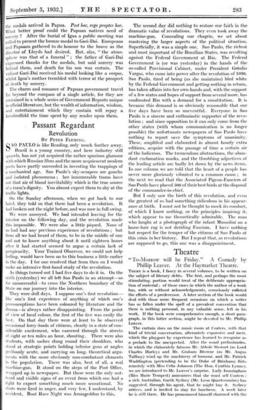Passant Regardant
Revolution
BY PETER FLEMING.
QA0 PAULO is like Reading, only much further away. L Brazil is a young country, and here industry still sprawls, has not yet acquired the rather spurious glamour with which Russian films and the more acquiescent modern poets have partly succeeded in investing the trappings of a mechanical age. Sao Paulo's sky-scrapers are gauche and isolated phenomena ; her innumerable trams have not that air of bland inevitability which is the true source of a tram's dignity. You almost expect them to shy at the traffic lights.
On the Sunday afternoon, when we got back to our hotel, they told us that there had been a revolution. It had broken out the night before, and was now in full swing.
We were annoyed. We. had intended- leaving for the interior on the following day, and the revolution made this impossible. We were also a little piqued. None of us had had any previous experience of revolutions ; but from all we had heard of them, to be in the middle of one and not to know anything about it until eighteen hours after it had started seemed to argue a certain lack of perspicacity. Your Trained Observer, we could not help feeling, would have been on to this business a little earlier in the day. I for one resolved that from then on I would make an intensive first-hand study of the revolution.
As things turned out I had five days to do it in. On the sixth (yesterday) we all left Sao Paulo in an attempt—so far unsuccessful--to cross the Northern boundary of the State on our journey into the interior.
They were dull days. I. suppose one's first revolution— like one's first experience. of anything of which one's preconceptions have been coloured by literature and the drama—is always rather disappointing. From the point of view of local colour, the first of the five was easily the best. On that day there were at least to be observed occasional lorry-loads of citizens, clearly in a state of con- siderable excitement, who careered through the streets at eight or ten miles an hour, shouting . There were also students, with sashes slung round their shoulders, who stood at strategic points holding inferior guns at angles perilously acute, and carrying on long, theoretical argu- ments with the more obviously non-combatant elements in the population. There was also, best of all, a real machine-gun. It stood on the steps of the Pod Office, wrapped up in newspaper. But these were the only out- ward and visible signs of an event from which one had a right to expect something much more sensational. No shots were fired in anger, and very few, I understand, by accident. Boat Race Night was Armageddon to this. The second, day did nothing to restore our faith in the dramatic value of revolutions. They even took away the machine-gun. Concealing our chagrin, we set about mastering the larger aspects of the political situation. Superfieially, it was a simple one. Sao Paulo, the richest and most important of the Brazilian States, was revolting against the Federal Government at Rio. The Federal Government is (or was yesterday) in the hands of the so-called Provisional Cabinet, under President Getulio Vargas, who came into power after the revolution of 1930. Sao Paulo, tired of being (as she maintains) bled white by the Federal Government and getting nothing in return, has taken affairs into her own hands and, with the support of a few states and hopes of support from several more, has confronted Rio with a demand for a constitution. It is because this demand is so obviously reasonable that our five days have been so uneventful. Everyone in Sao Paulo is a sincere and enthusiastic supporter of the revo- lution ; and since opposition to it can only come from the other states (with whom communication is no longer possible) the unfortunate newspapers of Sao Paulo have nothing to report save the symptoms of unanimity. These, amplified and elaborated in almost hourly extra editions, acquire with the passage of time a certain air of the ludicrous. The tremendous abstractions, the abun- dant exclamation marks, and the throbbing adjectives of the leading article are badly let down by the. news items. In one column we are told that the heart of a people has never more gloriously vibrated to a common cause ; in the next we read that the Associated Pigeon-Fanciers of Sao Paulo have placed 500 of their best birds at the disposal of the commander-in-chief.
But I only saw the birth of this revolution, and even the greatest of us had something ridiculous in his appear- ance at birth. I must not be thought to mock its conduct, of which I know nothing, or the principles inspiring it; which appear to me theoretically admirable. The man who laughs at a photograph of the infant Mussolini on a horse-hair rug is not deriding Fascism. I have nothing but respect for the temper of the citizens of Sao Paulo at this crisis in her history. But I repeat that, as revolutions are supposed to go, this one was a disappointment.






























 Previous page
Previous page